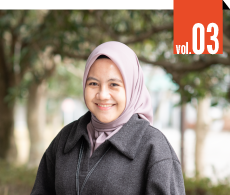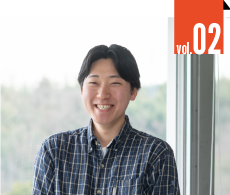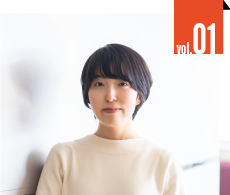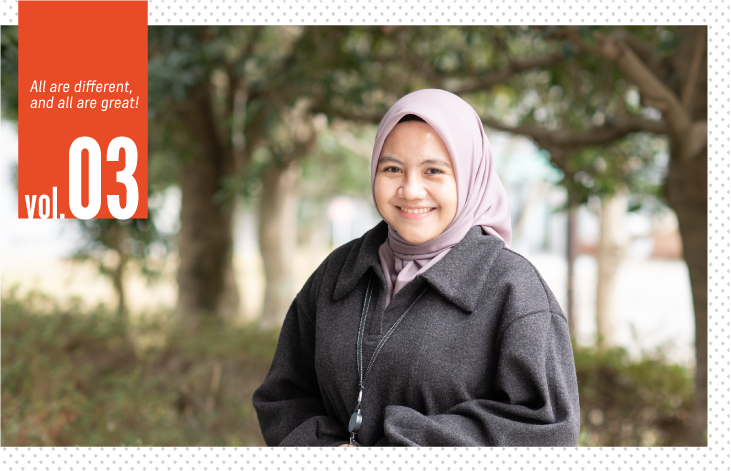
![]()
Nimatil Mabarroh
Division of Materials Science Laboratory of Solid-State Information Physics
Grade: 1st year, PhD student
Birthplace : Banten, Indonesia
Undergraduate Research: Magnetite nanoparticle as a label for giant magnetoresistance-based biosensor
Graduate school Research: Electronic state of artificially designed 3D Si facet line structure
Before joining NAIST
I graduated from the Department of Physics, Faculty of Mathematics and Natural Sciences, University of Gadjah Mada, Indonesia. We were conducting research on magnetic nanomaterials for application to magnetic sensors. In order to reduce hazardous waste and reduce the use of excess chemicals, we are creating magnetic nanomaterials with natural plant components, and applying these materials to biosensors. In my research, I use a giant magneto-resistive sensor, but unfortunately I can't build this equipment myself and learn more detail about it. When I was a master's student, I had a strong desire to pursue a PhD, but I needed to study abroad to continue my research with advanced facilities. Japanese universities provide us with advanced technology that overcome the limitations of learning. I came across NAIST while considering where to go.
NAIST has a very good relationship with Gadjah Mada University, where I was previously enrolled. NAIST is a well-known university in Indonesia, and my master’s supervisor said that NAIST is one of the great research institutes in Japan. So, based on his advice, I decided to participate in the pre-screening program. In this special program, you can get more information about each laboratory's research topics, professors, and scholarships.
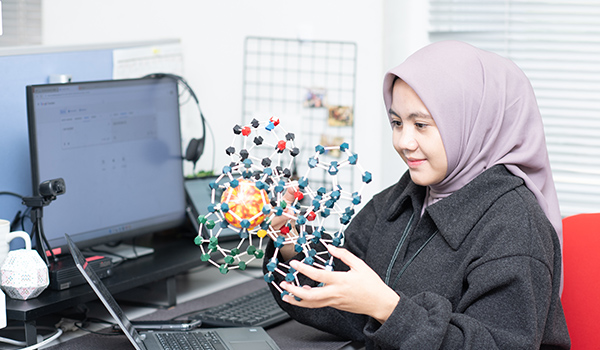
In general, I have heard that when some Indonesian students apply to Japanese universities, they have to find professors independently, sending e-mails many times, waiting for replies and other steps of enrollment. It takes a long time. However, at NAIST, you can communicate directly with professors throughout the program, and if you feel that the laboratory is not a good fit for you, you can consider another laboratory.
I was concerned about how NAIST would accept me as an international student and as a Muslim, but after participating in the pre-screening program, I felt that NAIST was welcoming to international students. I thought that if I went to NAIST, I would be able to meet many people with various backgrounds and learn more. The month after I completed my master's course, I was informed that I had passed the pre-screening and the Japanese Government Scholarship recommendation. Thanks to that, I did not have to waste time waiting until I left for Japan. Until admission, I was active as a research assistant in the laboratory for about half a year, and continued my research activities while preparing for departure.
In the selection process for the Ministry of Education, Culture, Sports, Science and Technology (Monbukagakusho) scholarship, many excellent applicants from not only Indonesia but many other countries in Southeast Asia are competing for a limited number of seats, so at first, I was not sure I would be able to receive the scholarship. However, I was eventually accepted.
NAIST also had a lower cost of living, especially the rent for the dormitory, which includes utilities. I don't know of any other university where you can stay in a dormitory for 10,000 yen. And you can walk to campus in 5 minutes.
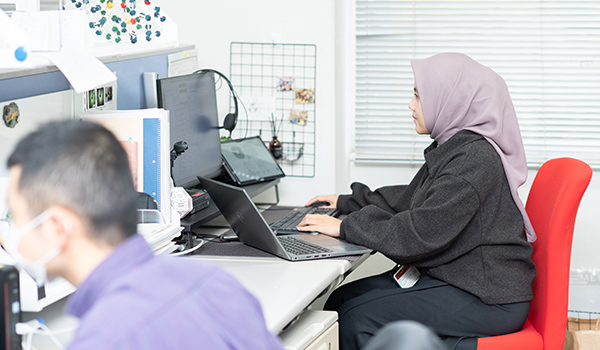
Current research and research life
I was attracted to the Solid State Physics Lab. In this lab, I expect to be able to gain a deeper understanding of this subject. I have consistent contact with my academic advisor and ask him to suggest a research theme. The analysis of electronic states , which I am currently working on, is new to me, but I feel that learning and pursuing this field is a great opportunity and a challenge. When I first entered NAIST, I was worried that I would not be able to make it through, but everyone is supporting me.
I am a Muslim and a minority in NAIST. We pray at least three times (mandatory) during the day on campus, about 20 minutes each time. The Division of Materials Science has set up a meditation room for prayer on the first floor of the research building. However, when I am busy with experiments, I may not be able to find time to go down from the laboratory to the first floor and pray. So, I asked the office if the women's locker room on the laboratory floor could be used as a temporary prayer room. The office has recently become available after coordination with the members of the laboratory. There are three Muslims on this floor, and each of them can bring their own small carpet to use. My supervisor took into consideration that I am a Muslim, and set the meeting time so that it would not overlap with the prayer time, so that I could carry out both the meeting and attending the worship service properly. I am very grateful.
It 's sometimes difficult to communicate smoothly in Japanese. I usually communicate with my lab members in English, and when I or they don't understand an expression, we patiently translate it using an online translator. Luckily, my academic advisor always communicates in English and translates from Japanese to English during group discussions. This greatly reduces this obstacle to communication.
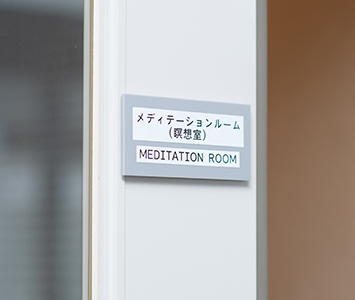
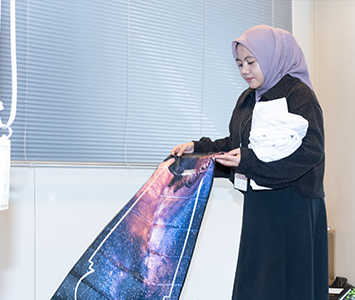
Challenges of NAIST’s research environment
Since it is not possible to get halal food at cafeterias, I sometimes cook and bring my own lunch, or order halal food delivery from Facebook and eat it with other students at the refreshment corner. In the future, I hope that NAIST will be able to provide halal food.
Nara is a strategic place to live and not a busy city, so you can focus on your studies. If you want to play , Nara is sandwiched between two big cities, Kyoto and Osaka, so it's easy to visit on your days off.
NAIST provides the best access to international students from all educational and cultural backgrounds. From the departure to the management during my stay, CISS has been really helpful to me, and there are plenty of activities to deepen my knowledge of Japanese culture, such as volunteer activities and festivals. The sanitary napkins in the women's restroom are very convenient and were very helpful when I had my period during lab activities.
Here you can build closer relationships with fellow Indonesians, but you can also build good relationships with students from other countries. Japanese students are very kind to us. Sometimes we are shy with each other, but overall they are nice and friendly.
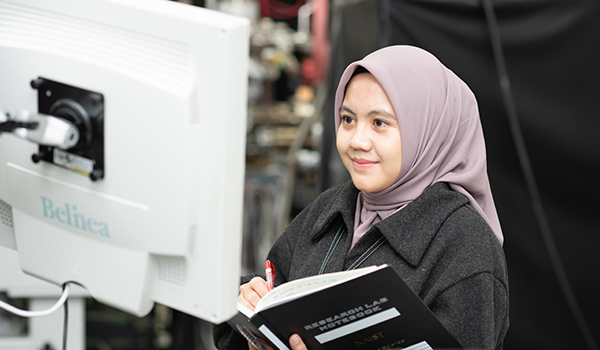
(March 2023)







